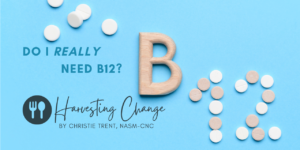Disclaimer: The information provided in this post is for educational purposes only and is not intended as medical advice. It is essential to consult with a healthcare professional or registered dietitian before making any significant changes to your diet or beginning any supplementation, especially during pregnancy or if you have specific health concerns. Individual nutritional needs may vary, and the content provided here does not replace personalized guidance tailored to your unique health circumstances. Always seek the advice of your physician or other qualified health provider with any questions you may have regarding a medical condition or dietary change. The…
-
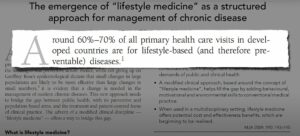 Continue Reading
Continue ReadingIf doctors can eliminate some of our leading killers by treating the underlying causes of chronic disease better than nearly any other medical intervention, why don’t more doctors do it?
-
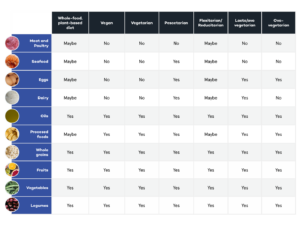 Continue Reading
Continue ReadingNourish Your Body Through a Variety of Diets Curious about different dietary approaches? This guide breaks down popular diets like vegan, vegetarian, pescatarian, and more, exploring what foods they include and exclude. Whether you’re looking to make a lifestyle change or simply want to understand the variety of eating patterns, this post covers the essentials of each diet.
-
 Continue Reading
Continue ReadingDaily recommended nutrition guidelines are designed to help individuals consume the right balance of nutrients to maintain optimal health. These guidelines provide specific recommendations for the intake of essential nutrients, including vitamins, minerals, carbohydrates, proteins, and fats. They vary based on factors such as age, gender, and activity level. By following these guidelines, individuals can ensure they are getting the nutrients their bodies need to function properly, support growth and development, and prevent chronic diseases. Focus on the Day, Not the Plate It’s important not to overanalyze every meal to ensure it meets all daily recommended nutrients. Understanding Recommended Dietary…
-
 Continue Reading
Continue ReadingThe Power of Plant-Based Protein Let’s talk about Essential Amino Acids Found Only in Plants What about your protein? In recent years, plant-based diets have gained significant popularity for their numerous health benefits and minimal environmental impact. One of the common concerns about plant-based diets is whether they provide all the essential amino acids required for optimal health. Essential amino acids are those that our bodies cannot produce on their own and must be obtained from our diet. While many people believe that these amino acids can only be found in animal products, there are actually several plant-based sources that…
-
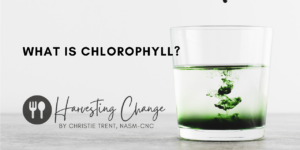 Continue Reading
Continue ReadingChlorophyll is not typically considered a supplement in the same way that vitamins or minerals are. It is a natural pigment found in plants, responsible for their green color, and is commonly consumed through green, leafy vegetables like spinach, kale, and broccoli. From my experience, I prefer liquid forms available now for taste, ease of use, and absorption. Some powdered supplements and foods can be overly processed, have binder agents, and at times may not be as effective. Chlorophyll is often marketed for its potential health benefits, such as detoxification, antioxidant support, and body odor reduction, as mentioned earlier. From…
-
 Continue Reading
Continue ReadingSupplementation vs. Natural: Finding the Balance for Optimal Health Do I need to supplement? As a vegan nutrition coach, I’ve heard all the jokes about vegans and supplements. “But where do you get your protein?” “I heard vegans need supplements to survive!” Yes, we’ve heard them all. But let’s set the record straight, shall we? First things first, yes, some vegans do need to supplement certain nutrients, like vitamin B12. Contrary to popular belief, vitamin B12 isn’t made by animals or plants; it’s made by bacteria. Since we don’t live in a world where we eat food covered in a…
-
 Continue Reading
Continue ReadingLet’s talk about turning our gut from misery to plant-powered bliss. Listen, real talk. Yes, plants are packed full of nutrients and fiber, but sometimes what you avoid eating is just powerful as what are ARE eating. I’ll share my deeply personal journey from a lifetime of seasonal allergies and ear infections to the transformative power of embracing a whole foods, plant-based diet. Get ready to be inspired, because this is a tale of resilience, renewal, and the astonishing capacity of the human body to heal itself! Prior to my voyage of gut-discovery, April showers brought May flowers but March…
-
Continue Reading
Fat Calculator Calories: Saturated Fat (g): Trans Fat (g): Calculate Actual: 0 calories from fat AHA Recommends: Less than 0 calories from fat Sugar Calculator Grams of Sugar: Women: American Heart Association recommends less than 25 grams (6 teaspoons OR 2 tablespoons) total per day. Men: American Heart Association recommends less than 36 grams (9 teaspoons or 3 tablespoons) of added sugar per day. Since labels are for 2000 calorie diets, you may want to plug in the macronutrients and then compare between the two. Nutrition Label Analyzer Daily Calories: Calories per serving: Total Fat (g): Saturated Fat (g): Sugars…
-
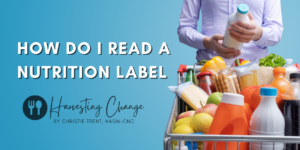 Continue Reading
Continue ReadingNavigating the aisles of the grocery store can be overwhelming, especially when you’re trying to make healthy choices for you and your family. One of the best tools at your disposal is the nutrition label but understanding it can be a challenge. Using the Nutrition Label above, answer the following questions: 1. What is the serving size?2. What is the calorie amount per serving?3. How much fat is in one serving?4. How many carbohydrates are in one serving?5. What percentage of your daily value of Vitamin C are in this serving6. How many grams of sugar are in this serving?…
-
 Continue Reading
Continue ReadingThe immune system is our body’s defense mechanism, protecting us from infections, inflammation, and chronic diseases. A healthy diet plays a crucial role in keeping the immune system strong and resilient. In recent years, the spotlight has turned to plant-based diets for their profound impact on immune function. Let’s dive into the science behind why plant-based diets can help boost and support your immune system. Rich in Antioxidants Plant-based diets are naturally rich in antioxidants, compounds that protect cells from damage caused by free radicals. Free radicals are unstable molecules that can weaken the immune system by causing oxidative stress,…

